
Bon Ami (French for 'Good Friend') is a brand of scouring powder sold by the Bon Ami Company of Kansas City, Missouri. Since its inception in the late 19th century, the brand's advertising campaigns have gained particular notice.

Bon Ami (French for 'Good Friend') is a brand of scouring powder sold by the Bon Ami Company of Kansas City, Missouri. Since its inception in the late 19th century, the brand's advertising campaigns have gained particular notice.

The original Bon Ami formula was developed in 1886 by the J. T. Robertson Soap Company as a gentler alternative to quartz-based scouring powders available in stores. [1] [2] In those days, scouring powder was made from tallow and finely ground quartz. When quartz was mined, it was entwined with feldspar, and the two had to be separated by hand. [3] The feldspar was discarded until Robertson discovered that this soft mineral could be combined with soap to create a less-abrasive product that would clean without scratching, resulting in the Bon Ami product. [4]
Bon Ami was originally manufactured in a factory in Glastonbury, Connecticut, which later moved to Manchester in the 1880s. [5]
As of 1896, Bon Ami was a common product in northeastern United States households. [4] The chick and slogan "hasn't scratched yet!" are textbook examples of an early American trademark. [6] [7] [8] Consumers in the late 1800s understood that a newborn chick doesn't scratch the ground for three days, thus the correlation with the non-scratching benefits of Bon Ami. [4]
In the early 1900s, Alfred William Erickson, founder of McCann Erickson Advertising, revived the brand with full-color pages in leading women's magazines. He accepted Bon Ami as a client circa 1908. [9] Artist Ben Austrian painted the prints, [2] [3] and Ben's wife served as the model in the ads. The campaign blossomed into literature with the release of The Chick That Never Grew Up, a work of children's literature featuring Princess Bon Ami. [2]
In 1963, Lestoil purchased an approximately 60% stake in Bon Ami. [10] Bon Ami merged into Lestoil in 1964, after protracted negotiations. [11]
In 1971, Bon Ami was purchased by the Faultless Starch Company, [12] which later changed the corporation name to Faultless Starch/Bon Ami Company to help reintroduce Bon Ami to the market.
In 1980, the company again revived its brand with a magazine campaign featuring the headline "never underestimate the cleaning power of a 94-year-old chick with a French name". [8] During the first 6 months of the campaign, Bon Ami sales rose 12%. [13] Nevertheless, its business was still flagging by 1983, when it remained in third place behind products from Procter & Gamble and Colgate-Palmolive. [12]
In 2011 the Bon Ami company celebrated its 125th anniversary by re-releasing the original cleaning cake for purchase. Limited supplies were offered both with and without a commemorative tin, celebrating the original formula's popularity. [14]
The product's slogan "hasn't scratched yet!" refers to its ability to avoid scratching porcelain plumbing fixtures. The Bon Ami mascot, a chick emerging from an egg, is a play on that slogan.
The product called "original" contains only feldspar. [15] For other products, the Bon Ami website lists the following as main ingredients: feldspar, limestone, water, baking soda, citric acid, corn alcohol, epsom salts, essential oils, and xanthan gum. [16]
The brand is also distributed in Canada as a glass cleaner.

In the comedy film The Ghost and Mr. Chicken , whenever discussing a murder at an old mansion, one character mentions that the police were unable to clean the blood off the organ keys, and another character adds, "And they used Bon Ami!" Lead actor Don Knotts personally got permission from the president of Bon Ami to include this reference to the company's product. [17]
In the F. Scott Fitzgerald novel Tender Is the Night , first published in 1934, Fitzgerald notes the routine of the character Dick Diver in cleaning up his workroom at his home outside Cannes: "He swept up, for no servants were allowed in there, treated his washroom sketchily with Bon Ami, repaired a screen and sent off an order to a publishing house in Zurich". [18]
In the first volume of his autobiography, Isaac Asimov recalls a box his family kept in the bathroom when he was a child, and how in his childish naïveté he was impressed that the company was so conscientious that if they ever found that the powder had scratched, they would change the slogan to "Only Scratched Once!" [19]
Jane Vandenburgh's novel Failure to Zigzag makes reference to Bon Ami's slogan "hasn't scratched yet". [20]

Sandstone is a clastic sedimentary rock composed mainly of sand-sized silicate grains. Sandstones comprise about 20–25% of all sedimentary rocks.
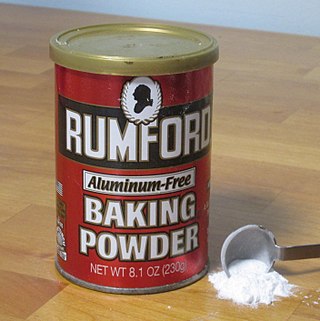
Baking powder is a dry chemical leavening agent, a mixture of a carbonate or bicarbonate and a weak acid. The base and acid are prevented from reacting prematurely by the inclusion of a buffer such as cornstarch. Baking powder is used to increase the volume and lighten the texture of baked goods. It works by releasing carbon dioxide gas into a batter or dough through an acid–base reaction, causing bubbles in the wet mixture to expand and thus leavening the mixture. The first single-acting baking powder was developed by food manufacturer Alfred Bird in England in 1843. The first double-acting baking powder, which releases some carbon dioxide when dampened and later releases more of the gas when heated by baking, was developed by Eben Norton Horsford in the U.S. in the 1860s.
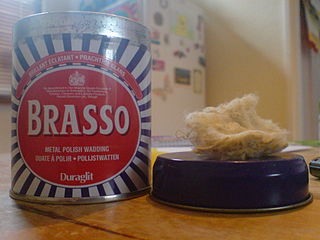
Brasso is a metal polish designed to remove tarnish from brass, copper, chrome and stainless steel. It is available either directly as a liquid or as an impregnated wadding pad.

Vim is the name of a range of household cleaning products originally produced by Lever Brothers. The Vim brand is currently owned by the German multinational company Henkel, while Unilever retains ownership in Canada and Vietnam.

Persil is a German brand of laundry detergent manufactured and marketed by Henkel around the world except in the United Kingdom, Ireland, France, Latin America, China, Australia and New Zealand, where it is manufactured and marketed by Unilever. Persil was introduced in 1907 by Henkel. It was the first commercially available laundry detergent that combined bleach with the detergent. The name was derived from two of its original ingredients, sodium perborate and sodium silicate.
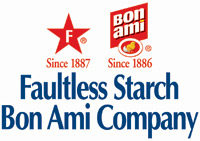
Faultless Brands is a manufacturing business, producing laundry, household cleaning products, air care, and lawn and garden products. The company headquarters are located in Kansas City, Missouri, United States.

Zest is an American brand of soap and body wash owned by High Ridge Brands for the United States, Canada and Puerto Rico and by Unilever for the rest of the world. It was originally introduced by Procter & Gamble in 1955 with the slogan "For the first time in your life, feel really clean."

Henkel AG & Co. KGaA, commonly known as Henkel, is a German multinational chemical and consumer goods company headquartered in Düsseldorf, Germany.

Ajax is an American brand of household cleaning products and detergents made by Colgate-Palmolive. The brand is also licensed by Colgate-Palmolive in the United States, Canada and Puerto Rico.

The economy of the Kansas City metropolitan area is anchored by Kansas City, Missouri, which is the largest city in the state and the 37th largest in the United States. The Kansas City metropolitan area is the 27th largest in the United States, based on the United States Census Bureau's 2004 population estimates. The metro's economy is large and influential to its region.
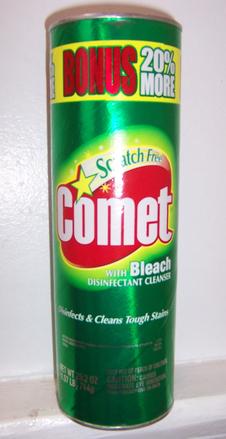
Comet is an American brand of scouring powders and other household cleaning products manufactured by KIK Custom Products Inc. The brand was introduced in 1956 by Procter & Gamble (P&G) and sold to Prestige Brands in 2001. In 2018, Prestige Brands sold the Comet brand to KIK Custom Products Inc. P&G retained the rights to market the brand in Europe and to the professional market (non-home-consumer) in the United States.

Colgate is an American brand principally used for oral hygiene products such as toothpastes, toothbrushes, mouthwashes and dental floss. Manufactured by Colgate-Palmolive, Colgate's oral hygiene products were first sold by the company in 1873, sixteen years after the death of the founder, William Colgate. The company originally sold soap.
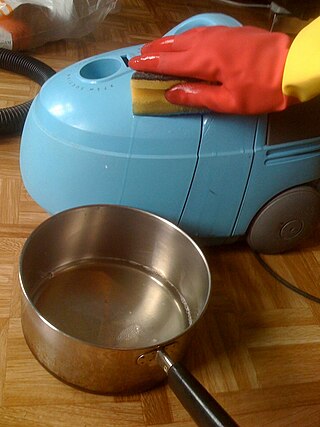
Cleaning agents or hard-surface cleaners are substances used to remove dirt, including dust, stains, foul odors, and clutter on surfaces. Purposes of cleaning agents include health, beauty, removing offensive odor, and avoiding the spread of dirt and contaminants to oneself and others. Some cleaning agents can kill bacteria and clean at the same time. Others, called degreasers, contain organic solvents to help dissolve oils and fats.

Bar Keepers Friend is an American brand of mass-produced cleaning agents. The original canned scouring powder product has been manufactured and sold since 1882. It was invented by a chemist in Indianapolis, Indiana, where it continues to be manufactured by SerVaas Laboratories. The canned product's primary active ingredient is oxalic acid. Bar Keepers Friend has various cleaning uses.

Fairbank's Gold Dust washing products was a line of all-purpose cleaning agents researched and developed by the N. K. Fairbank Manufacturing Company. First introduced to the American consumer in 1889, Gold Dust Washing Powder became a success due in large part to its low selling price and bright, eye-catching packaging. The most easily recognized members of the soap line were Gold Dust Washing Powder and Gold Dust Scouring Soap. They were marketed in boxes and containers prominently featuring the brand's well known trademark, the Gold Dust Twins. "Let the Twins Do Your Work" was the product's long lasting and ubiquitous slogan.

Lestoil is a registered trade name of Clorox for a heavy-duty multipurpose cleanser product, used to remove extremely difficult laundry stains, dissolve water-based and oil-based paints, and clean grease, oil, paint, and adhesives from floors and surfaces. It was introduced as a dry cleaning fluid for laundry in 1933. As a company, Lestoil, also known as the Adell Chemical Company, also made Bon Ami, from 1964 until 1971.
Scouring powder is a household cleaning product consisting of an abrasive powder mixed with a dry soap or detergent, soda, and possibly dry bleach.

Bombril is a Brazilian manufacturer of household cleaning agents. Their main product is a fine-grade steel wool marketed with the brand "Bom Bril". The company at one point had 90% share of the Brazilian market for that product, and the brand name is, to this day, used in the country as a metonymy to steel wool in general, although the company manufactures other products as well.

Finish is the brand name of a range of dishwasher detergent and cleaning products sold by the consumer products manufacturer Reckitt. The tablets, based on the original product, contain surfactants which counteract water hardness and break down foods containing starches and proteins, and remove bleachable stains and produce enzymes and foams. The product is specially designed for dishwashers. Prior to 2009, the product was known as Electrasol in North America, and as Calgonit in some European countries.